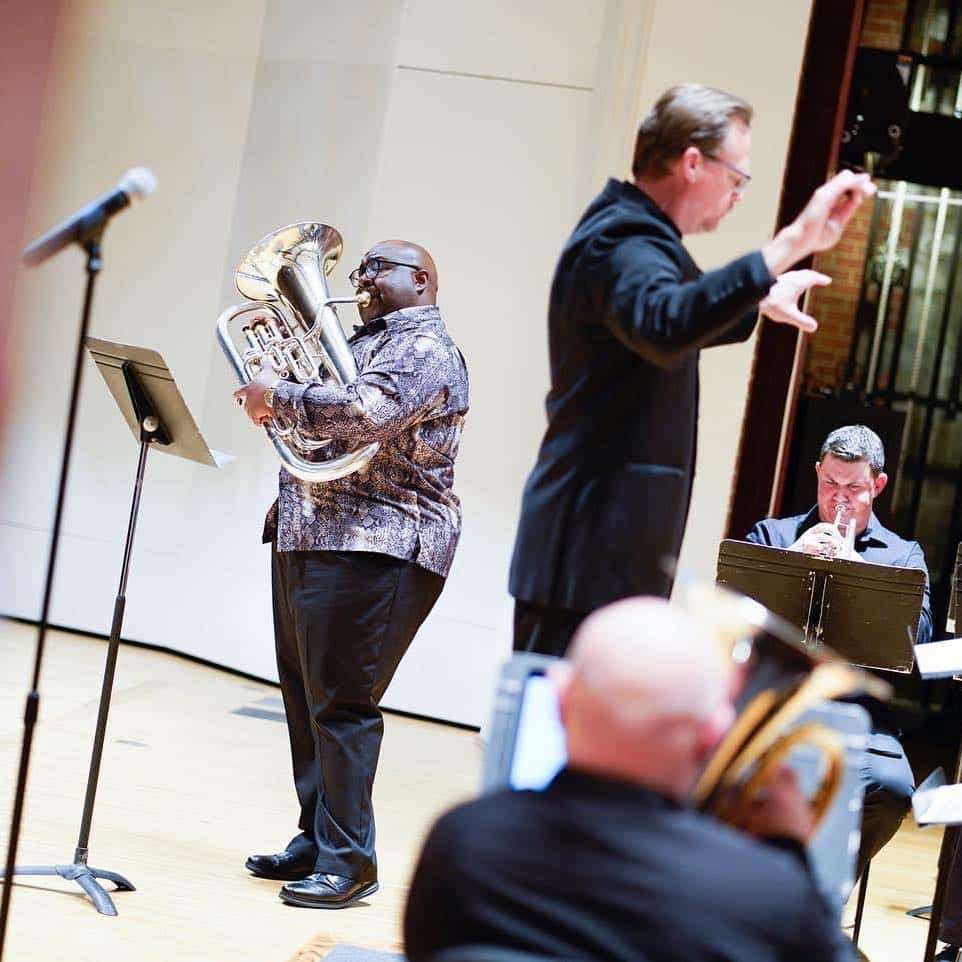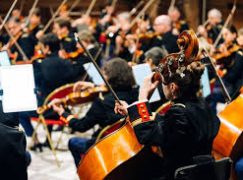Oxford Brookes killed music department just after creating concert hall
NewsIt has emerged that the decision to shut down the music department was taken shortly after Oxford Brookes University opened a £1.6 million new campus with a purpose-built performance space.
Dr Barbara Eichner, reader in music told the Oxford Mail: ‘We are all devastated and in shock. Music as a subject has been under pressure nationwide. It hasn’t been an easy situation in the last few years with the pandemic. We’ve just had the new building go up where we could have had a proper performance space for the first time. It’s sad to think there won’t be any students making music in there.’
Local MP Anneliese Dodds said: ‘I was really concerned to hear about the closure of both mathematics and music at Oxford Brookes University. Please can I take this opportunity to urge the university to consider the impact of this on staff in both subject areas, for whom this must be a very worrying time.’
What’s really worrying is the intellectual calibre of executives who make these decisions and the mediocre design of the buildings they commission.






Brilliant strategic planning
‘I was really concerned to hear about the closure of both mathematics and music at Oxford Brookes University.”
How about Gender Studies? Queer Studies? Beer Studies? Drug Studies?
The only thing more ridiculous than Oxford is Cambridge. See, folks, you don`t need the EU to go woke. And down, down, down.
We live a time in which priorities are reversed. In music organizations, this means that the institution is viewed as a self-sufficient entity that has intrinsic value, outside of the people who make it possible in the first place — this is true not just for teaching environments, but for orchestras as well. Priority is placed not on educators or musicians — on those who make the organization possible in the first place — but rather on the sheer body of the institution, as if an institution had intrinsic value on its own, without the very people who actually make it possible. In this regard, universities, as well as orchestras/opera companies, are often obsessed with displaying beautiful buildings and amenities, and do not hesitate to spend large sums of money to do so, at the expense of the very people who give such buildings an actual reason to exist. Beautiful buildings look good and are truly valued. It is a form of callous corporate and soulless narcissism. It is also a way to appeal to the philistine consumerism that in our day and age has become heightened to an ideal.
Together with this trend, there is also a tendency for people involved in administration to view themselves and even put themselves forward as the most essential part of the organization, whereas teachers and performers are relegated to the rank of hired help and viewed as utterly dispensable. It truly is the world turned upside down. This is the general trend of a society that celebrates administrators and paper pushers, often hired on the basis of their capacity for keeping under control those which are viewed simply as employees, for their capacity to play the role of polished mouthpieces who can effectively deliver meaningless sophistry to boards and to the press, in a manner that is quite appealing to the clueless corporate mindset of today’s deciders, who are obsessed with appearances.
You are correct on all counts. Its the same here in the States. The West is in full moral and cultural collapse.
Such is the situation in the London orchestras. LSO, RPO, LPO, Philharmonia. The actual body of musicians, who create the work, which enables the admin to have a job, are treated as second class job entities. I see it each day; sadly, if one speaks out, one is deemed a trouble maker! Let’s be honest, most of these admin are failed musicians and bear large chips on their shoulders.
Wasn’t there an episode of Yes, Minster with a brand spanking new hospital, fully staffed with administrators, but no medical staff or patients? Satire becomes reality….
At its simplest this is another example of an academic institution that is clueless regarding joined-up thinking. The comment about poorly-designed buildings is however in this context a little hard to understand.
I currently work at OBU as a lecturer for over 20 years. Naturally, I wish to remain anonymous. I’m not sure which buildings Annabel Dodds thinks are ‘mediocre’ because the vision of our previous vice-chancellor Janet Beer for the Headington campus is widely views as pressive. Since her time there have been some questionable decisions, but for all the dramatic talk the truth is many departments are simply not recruiting students. Whose fault is that?
This is part of a wider crisis in HE in the UK which is likely to explode in the next decade
There’s an unsettling imbalance in the music landscape. While there’s a surplus of places training musicians, there’s a notable shortage of performance venues like opera houses, orchestras, and festivals. Additionally, the decreasing emphasis on music education in primary and secondary schools is worrying.
Over the last century, the music industry has shifted from a focus on performing and composing to primarily training musicians. This creates a cycle where trained musicians, when reaching their prime, often turn to teaching. This structure resembles a pyramid scheme within the music profession.
The closure of a university music department is not tragic to me (there are far too many places to train as a musician), the disbandment of orchestras, discontinuation of festivals, and reduced music hours in elementary education are genuine concerns. These events represent a loss of cultural heritage and limit opportunities for aspiring musicians and public exposure to live music.
Doing it after building an auditorium is just bad planning and a waste of resources.
Universities do so much more than just train musicians, and a music degree is a gateway to a wide range of careers. Some music students become performers, music teachers, music producers etc., but many others take up entirely different careers!
Is a performance space the same as a concert hall? Just asking, since Oxford Brookes continues to offer a BA in Drama, Theatre and Acting.
I was shocked and disheartened to read the report of Brooks College, Oxford which was sent me by John Mills the international guitarist and my long-time friend and collaborator.
I cannot believe that an internationally renowned institute of learning would foreclose and abandon such distinguished subjects as Music and Mathematics. As far back as the ancient Greeks, who based their learning on music, mathematics and rhetoric, humankind has recognized that Music & Mathematics are fundamental to mental growth and societal development.
I am sad to say that this move reflects a disturbing trend in societal leadership that mastery of tow such difficult and pure subjects as Music and Math are mere frills that can be dispensed with at will. Nothing could be further from the truth. Remember Einstein, or have these decision makers forgotten who he was?, was not only one of the greatest physicists but also a great musician.
What’s going on at Brooks, aide and abetted by institutes and governments who have lost their way, is not restricted to that institute alone. It is going on all across the western developed world. I live in Newfoundland, Canada (Capital St. John’s has 150,000 and a Province the size of England and France a total population of half a million!) where despite our small population we have a thriving arts, science and music culture. The Symphony Orchestra is made up of 70 paid Professional musicians and still plays core literature as well as more popular fare to full houses and completely solvent. There is a thriving live music and theatrical scene where many performance artists make a living and a visual arts scene the envy of many other Canadian cities. In support of all this is a world renowned university as well as separate technical institutes. I state all this because of the marked contrast to what is happening elsewhere.
Recently a wonderful Canadian orchestra, Kitchener-Waterloo, with a distinguished history and discography closed through lack of funds. Others on the mainland are also under threat mainly due to lack of support from their governments. Lest government and civic leaders think that these institutes can thrive without support they are grossly misinformed. I do not see them saying the same about local parks, playgrounds open spaces etc. Or, are they the next on the chopping block?
Western society seems to have lost its way in favour of the IPad., social media, fake news and ultra consumerism. When I watch soccer, which I do love from time to time, I am struck by the magnitude of the sport in the UK. and the millions who each week spend multi-millions of pounds they cannot afford. Now we have drones you can see these stadiums from the air. They remind me of what the Roman Forum must have been like 2000 years ago. Groups of individuals battling it out in front of people cheering and jeering with the protagonists fighting for obscene amounts of money and personal notoriety with the last fighters standing battling it out at the cup final. Supporters baying and screaming with mouths wide open…Is this encouraged by governments to keep the general public quiet and acquiescent?..How far have we really come in 2000 years.?
Coming back to music, my subject, It is interesting to note that in the far east classical music and studies are as strong as ever. I was recently on a national finals jury for young musicians aged 8 -17. It was interesting to judge over two weeks young players executing major works by Beethoven, Chopin, Prokofiev etc. perfectly and with tremendous technical assurance. It was sad to note that of the more than 150 players at least 90% were of Asian origin.
What next for Europe and N. America? Are these the next “Lost Continents”
Dr. Peter Gardner
St. John’s, NL, Canada